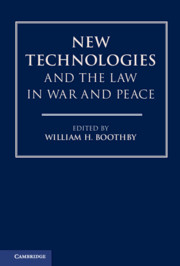Book contents
- New Technologies and the Law in War and Peace
- New Technologies and the Law in War and Peace
- Copyright page
- Contents
- Contributors
- Preface
- Abbreviations
- Part I The Legal Background
- Part II Applying the Law to Some New Technologies
- 5 Cyber Capabilities
- 6 Highly Automated and Autonomous Technologies
- 7 Military Human Enhancement
- 8 Legal Aspects of Human Enhancement Technologies
- 9 Human Degradation Technologies and International Law
- 10 Nanomaterials: A Tale of Two Applications
- 11 Naval Technologies
- 12 Outer Space
- 13 Synthetic Brain Technologies: Beyond Artificial Intelligence
- 14 Biometrics
- Part III Conclusions
- Select Bibliography
- Index
5 - Cyber Capabilities
from Part II - Applying the Law to Some New Technologies
Published online by Cambridge University Press: 14 December 2018
- New Technologies and the Law in War and Peace
- New Technologies and the Law in War and Peace
- Copyright page
- Contents
- Contributors
- Preface
- Abbreviations
- Part I The Legal Background
- Part II Applying the Law to Some New Technologies
- 5 Cyber Capabilities
- 6 Highly Automated and Autonomous Technologies
- 7 Military Human Enhancement
- 8 Legal Aspects of Human Enhancement Technologies
- 9 Human Degradation Technologies and International Law
- 10 Nanomaterials: A Tale of Two Applications
- 11 Naval Technologies
- 12 Outer Space
- 13 Synthetic Brain Technologies: Beyond Artificial Intelligence
- 14 Biometrics
- Part III Conclusions
- Select Bibliography
- Index
Summary
- Type
- Chapter
- Information
- New Technologies and the Law in War and Peace , pp. 85 - 136Publisher: Cambridge University PressPrint publication year: 2018



